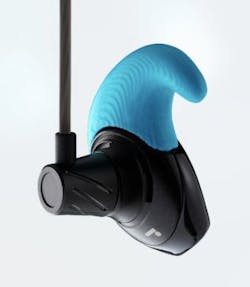3D Printing Moves into the Manufacturing Mainstream
For years the talk around 3D printing/additive manufacturing has been about how it will, one day soon, transform the manufacturing industry. Though the full transformation has not yet arrived, the process of moving 3D technology out of purely prototyping applications and lab development and into the manufacturing process has definitely begun.
Two recent announcements highlight the ongoing transition: 1) The use of 3D printers from Stratasys to produce customized earphones on a mass scale; and 2) TÜV SÜD certification for Renishaw’s AM250 laser melting machine designed for use in manufacturing environments.
Custom earphone manufacturer Normal is using Stratasys 3D printers for mass customization of its earphones. Normal’s earphones are customized to fit each user’s ear and can typically be delivered anywhere in the U.S. within two days. The company uses 10 Stratasys Fortus 250mc 3D printers to manufacture custom parts for the earphones using FDM 3D printing technology. The 3D printed part of the earphones is made with ABSplus thermoplastic and is available in seven colors. Each pair of earphones is engineered, 3Dprinted, assembled and shipped at Normal’s flagship retail store in New York City.
Creating more of an impact on the traditional manufacturing space is Renishaw’s announcement that is has obtained a compliance certificate from TÜV SÜD for its AM250 laser melting machine. Renishaw points out that this machine is “intended to help 3D printing evolve from being considered an emerging technology, reserved for design and testing, into a mainstream manufacturing tool.”
The TÜV SÜD certification confirms that Renishaw’s AM250 laser melting machine can be implemented in a manufacturing environment without the need for additional testing or field inspections. Since it confirms the equipment is a ruggedized, fully-tested, fully-functional structure that can be used 24/7 in industrial environments, this certification is critical for manufacturing industries such as automotive, aerospace or electronics.
The AM250 laser melting or metal 3D printing machine uses an ytterbium fiber laser to fuse fine metallic powders to form functional 3-dimensional parts. The machine can reportedly produce a variety of structures, from implantable medical devices to complex aerospace geometries. A diverse range of materials can be used for the products, including different grades of stainless steel, or aluminium, titanium and cobalt-chrome alloys.
You can learn more about how 3D printing/additive manufacturing will impact the manufacturing industries—from product development to intellectual property rights—by attending The Automation Conference 2015, May 19-20, 2015.
About the Author
David Greenfield, editor in chief
Editor in Chief

Leaders relevant to this article:

